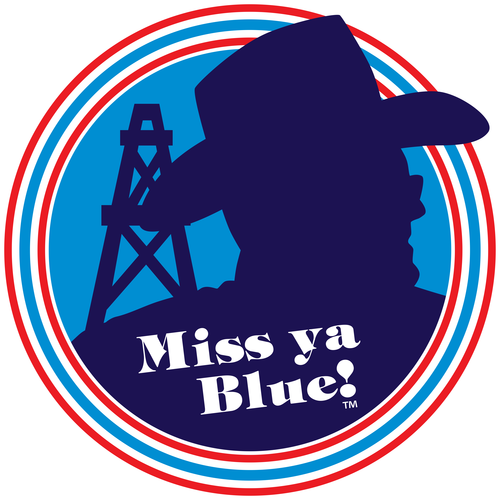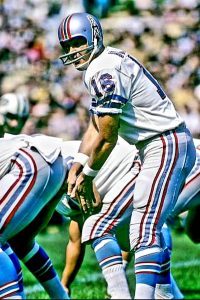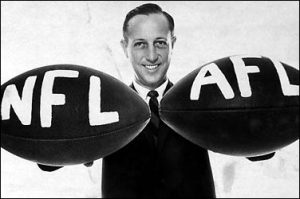The 1963 Season, Part 3
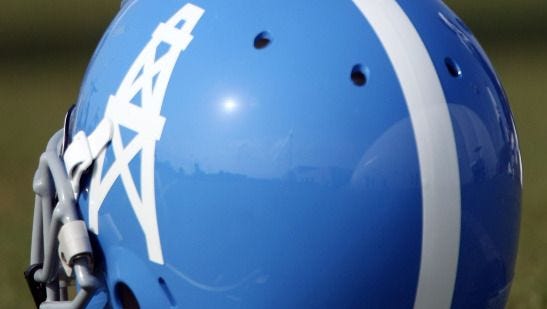
“The See-Saw Season Bottoms Out”
By ED WETTERMAN
PREVIOUSLY – The 1963 Season, Part 1: “The Beginning of the End of the Run”
PREVIOUSLY – The 1963 Season, Part 2: “A See-Saw Start to the Season”
Having apparently righted the ship from a 1-2 start, the Oilers had won four of their last five and three straight to sit at 5-3 just past the halfway point in the regular season.
However, as generations of Columbia Blue faithful would learn in the decades to come, when the Oilers looked their best, that was a prelude to a fall.
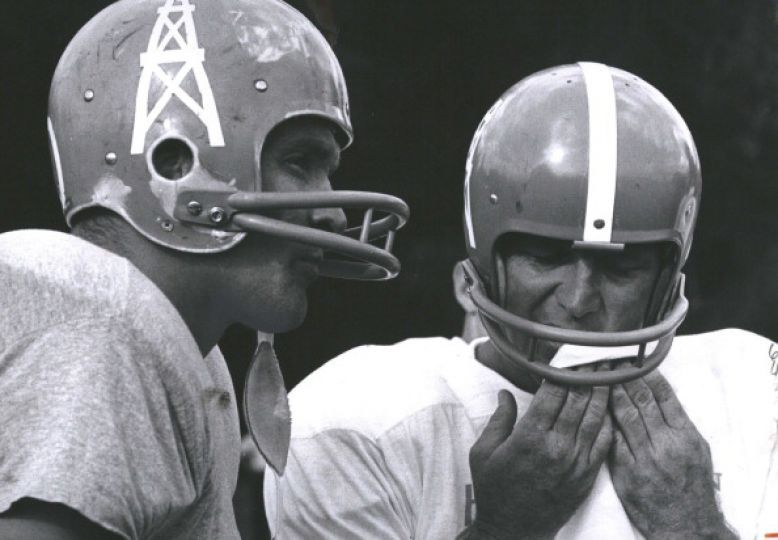
This first crash-and-burn saga began in Week 9 against the Boston Patriots coached by Mike Holovak (whom we will discuss later in our coverage of Oiler history).
The homestanding Patriots jumped out to a 21-point head start before George Blanda finally got Houston on the board in the second quarter with a 46-yard field goal.
Shortly thereafter, though, Blanda threw a pick to Bob Suci, who ran 98 yards for another Patriot touchdown, giving them a 28-3 halftime lead.
The second half was a Patriots dam-break as they ran up the score to crush the Oilers 45-3, the worst beating in the four-year history of the Oilers.
Blanda went 7-for-21 for 76 yards and three interceptions and was replaced by Jacky Lee, who fared no better, going 12-for-24 for 163 yards and three interceptions.
Charley Tolar managed just 18 yards on nine rushes, and the Oilers lost stalwart defender Don Floyd with a broken jaw, which hampered their run defense for the rest of the season.
The 5-4 Oilers then limped home to tangle with the New York Jets in Jeppesen Stadium and managed to pull out a 31-27 shootout victory.
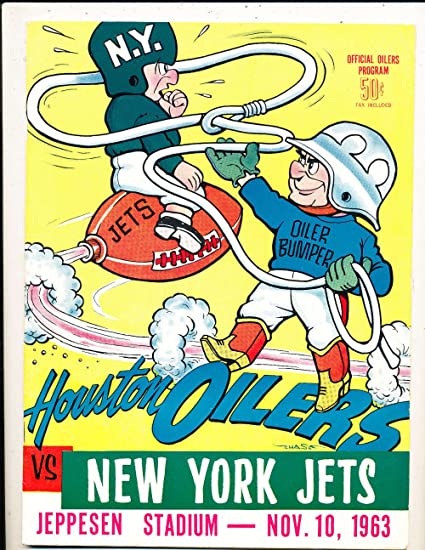
Bill Tobin was the star of the game for Houston with rushing touchdowns of seven, five, and four yards.
The Oiler defense forced five interceptions from New York’s Dick Wood, while Blanda had none.
The Oilers now found themselves with a 6-4 record and sole possession of first place in the AFC’s Eastern Division with just games left in the season.
Headed into their bye week, they were solidly in control of their own destiny with a viable shot at another championship run, but that wasn’t meant to be.
In fact, with their win over the Jets, they had tasted their last victory of the season.
After an unplanned second consecutive weekend off due to the assassination of U.S. President John F. Kennedy, the Oilers ventured westward to play in San Diego’s Balboa Stadium against their old nemeses, Coach Sid Gillman and his San Diego Chargers.
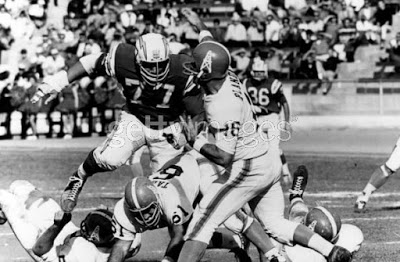
The Chargers sported a league-best 8-2 record. However, as the Houston Post pointed out, since the AFL’s inception, the Oilers had won four of six regular-season games against the Bolts and had beaten them in the 1960 and 1961 AFL championship games.
In this case, though, trends didn’t matter at all, as the Oilers imploded, and the Chargers exploded, blanking Houston 27-0.
Blanda’s passing woes continued, as he finished just 9-for-26 with 110 yards and two interceptions.
He was again benched in favor of Lee, who went 4-for-6 with 41 yards and an interception.
The Oilers fell to 6-5, yet they still harbored a chance to win the Eastern Division but needed to get by Patriots, with whom they’d tangled just three games prior and lost by 42 points.
The Patriots came to Houston and simply continued where they left off in their previous game against the Oilers, winning 46-28 and scoring 31 unanswered points in the second and third quarters.
Neither Blanda or Lee could get the Oilers competitive in this one.
Although the Oilers fell to 6-6, they still had a shot at the division crown if they could manage to win their final two games.
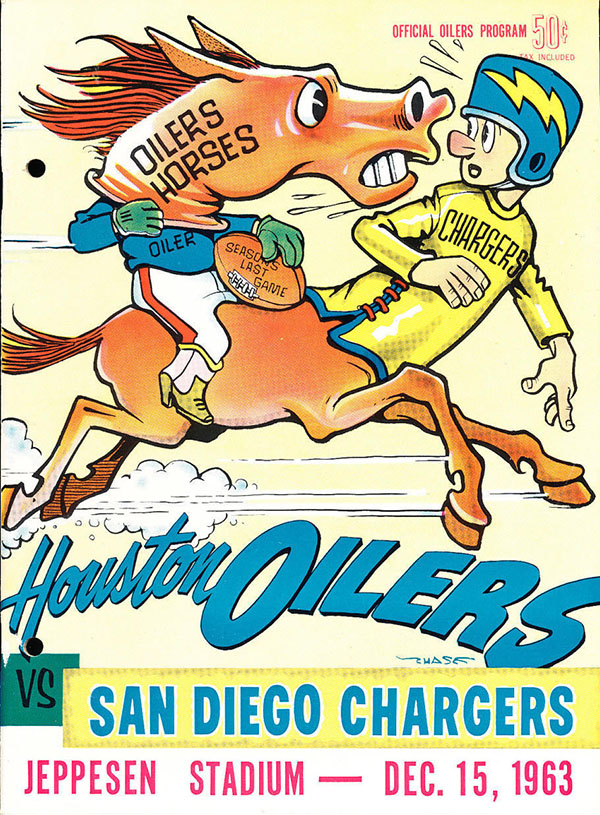
The first of those would be a rematch with the Chargers, and while this one was much more competitive than their prior meeting two weeks before, the Oilers still lost 20-14.
After a scoreless first quarter, the visiting Chargers took a quick 14-point lead in the second, but the Oilers responded with a 24-yard touchdown pass from Blanda to Willard Dewveall, cutting the San Diego lead to 14-7.
The Chargers added two more field goals (one before halftime and another in the third), while the Oilers could only manage one more touchdown in the fourth quarter on a one-yard plunge by Bo Dickinson.
To complete the season, the 6-7 Oilers would play the Raiders, against whom they’d started the campaign with a 24-13 loss.
The final game was an offensive eruption with both teams scoring practically at will, particularly in the second quarter.
After building a 14-7 first-quarter advantage, the Oilers added three more touchdowns before the half ended, but they also surrendered 28 points in the second quarter to the Raiders and went to the locker room tied with Oakland at 35-35.
Houston entered the fourth quarter with a 49-42 edge, but the Raider defense finally managed to snuff out the Oiler offensive attack and shut them out in the final period.
The Raiders knotted the game at 49-49 then provided the winning margin via a 39-yard field goal with 4:37 left in the game.
Although insufficient, scorers abounded on the day for Houston.
Charlie Hennigan caught a four-yard touchdown pass.
Dewveall scored on receptions of 12 and 26 yards, Dave Smith added two rushing touchdowns of two and 25 yards, Tolar scored on a one-yard dive, and Bob McLeod scored on a 21-yard pass.
Although they’d had their chances for postseason glory, the 6-8 Oilers were left on the outside looking in for the first time in franchise history.
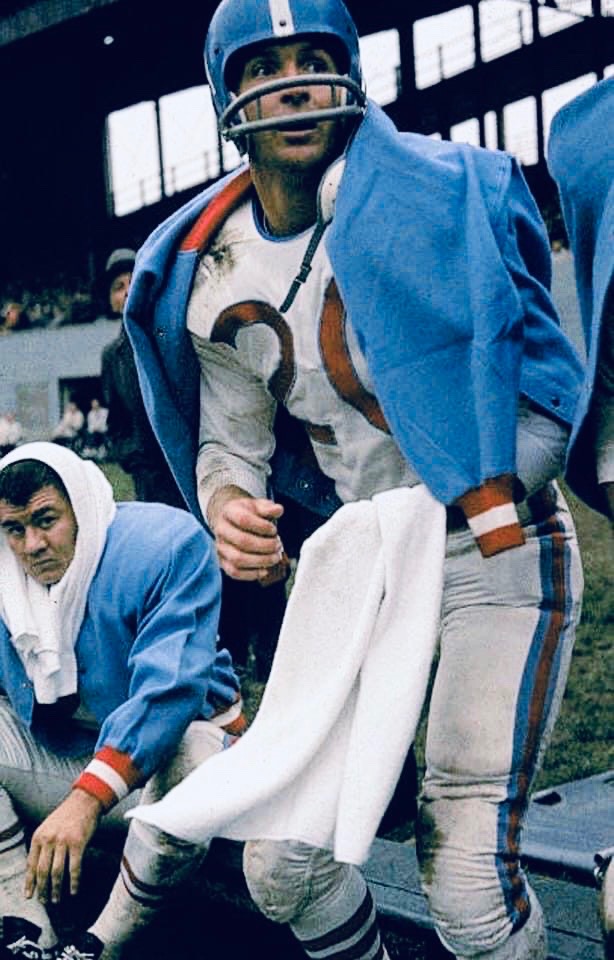
Injuries to Billy Cannon (who would no longer wear the Oiler uniform after the 1963 campaign) and Smith left the Oilers next-to-last in the AFL in rushing offense.
Despite many takeaways, the Houston defense gave up far too many yards both in rushing and passing.
Although Blanda finished with more touchdowns than interceptions, those results were not enough to win the final two games.
The bright spot of the team was the play of cornerback Fred Glick, who snagged 12 interceptions over the course of the 14-game season, good for one-third of the team’s 36 total interceptions.
Houston Head Coach Pop Ivy took the blame for the Oilers’ misfortunes, saying he “should have pressed the players more. They were out of shape.”
Ivy promised the team would do better in 1964, that he would work them harder, and that they still were a great and talented team.
The 1963 season clearly signaled a shift in the AFL’s power structure.
Al Davis had taken a 1-13 Oakland team, boosted their fortunes to 10-4, and won AFL Coach of the Year honors.
Although the Raiders would not become championship material until later in the decade, the die had been cast for their future success.
The Chargers annihilated the Patriots 51-10 in the championship game, and San Diego would take Houston’s place as a perennial contender by also appearing in the next two title tilts.
UP NEXT – The 1964 Season, Part 1
Ed Wetterman is a native Houstonian and lifelong Oiler fan/historian. He is a teacher, genealogist, game creator, and writer who lived and died on Sundays with the Oilers. Ed has created many games such as “East Texas University: Degrees of Horror” and written short stories such as “HellFighter,” published by Pinnacle Entertainment Group. Football has always been one of his greatest passions. He experienced the highs and the lows of being an Oiler fan, and like many others, he was crushed when the Oilers left Houston. Writing for Miss Ya Blue! gives him an outlet for his Columbia Blue love.
#houston #oilers #htown #houstontx #houstonoilers #nfl #astrodome #sports #star #history #football #luvyablue #missyablue #texas #houstonblogger #throwback
